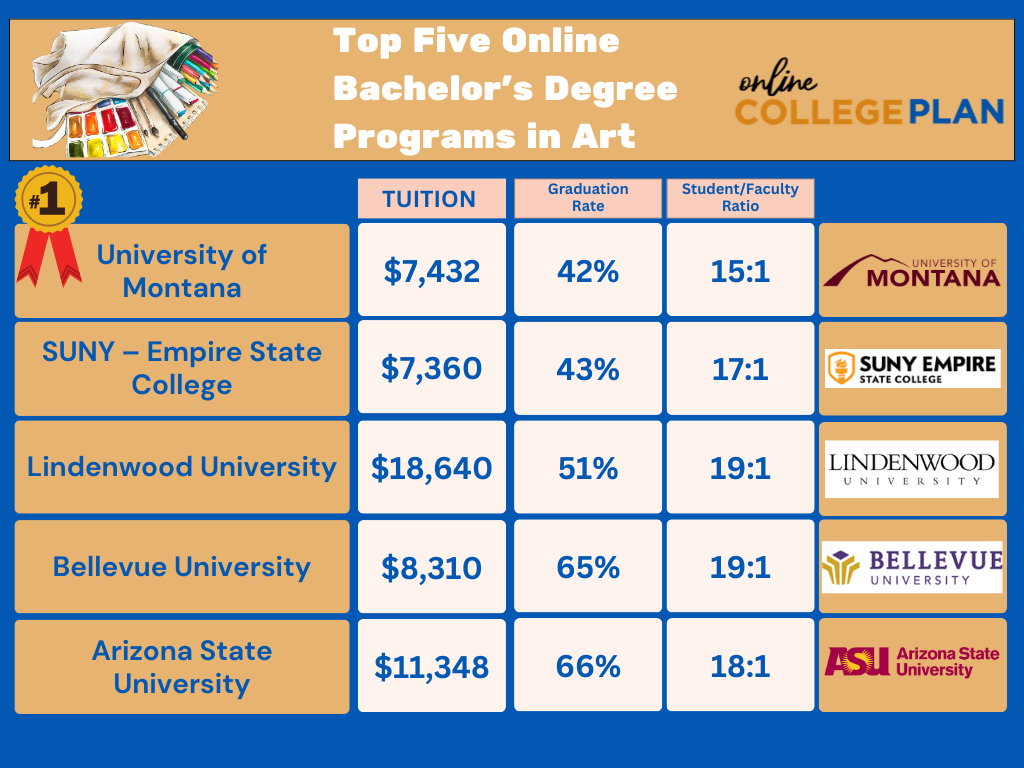What Are the Best Schools for Online Bachelor’s Degrees in Art?
Find your degree

Finding the perfect school for an online bachelor’s degree in art is a thrilling adventure, given the multitude of options at your fingertips. The beauty of online education is that it has opened up a treasure trove of diverse programs from across the country—and, indeed, the world. But not all programs are cut from the same cloth, so it’s crucial to thoroughly explore the ideal fit for you. If you’re ready to check out the best online art colleges, you’re in the right place.
Find Your Perfect Match: How to Choose the Best Online Bachelor’s Degree in Art School
Before diving into the selection process, let’s examine what an online bachelor’s degree in art entails. These programs are designed to give students a comprehensive understanding of art history, theory, and practice. They typically cover a wide range of topics, including drawing, painting, sculpture, photography, graphic design, and more. Online programs offer students the flexibility to study at their own pace, from anywhere in the world, and often include interactive coursework and virtual studio experiences.
Assess Your Artistic Goals and Needs
When choosing the best school and program for your online bachelor’s degree in art, think first about your artistic goals and needs. Look for programs that align with your interests and offer the courses and resources you need to reach your goals. Additionally, examine factors like the program length, admission requirements, and tuition costs.
Identify Your Focus Area
To properly assess your artistic goals, you need to identify your focus area. Do you prefer painting, drawing, sculpture, or digital art? Are you interested in art history or art education? Once you have identified what matters to you most, you can search for programs that offer courses in that area.
It is also important to consider the level of specialization you want. Some programs offer a broad range of courses in various art forms, while others focus on just one area of art. If you have a specific career goal, such as becoming a graphic designer or art therapist, you may want to choose a program that specializes in that area.
Career Aspirations
Another essential factor to consider is your career aspirations. What do you want to do with your degree? Do you want to work as a professional artist, art teacher, or in a related field? Are you interested in digital media, graphic design, animation, or filmmaking? Where do you see yourself after graduation?
If you are unsure about your career goals, it may be helpful to research different career paths in the art industry. This can help you identify the skills and knowledge you will need to succeed in your chosen field and choose a program that will provide you with the necessary training. One way to do this is by taking a few free or inexpensive online courses.
Why Pursue Your Art Degree Online?
Online bachelor’s degrees in art are becoming increasingly popular due to their flexibility and convenience. Students can learn and complete coursework from anywhere, at any time, making it easier for those who may have work or family commitments. However, it is crucial to understand the structure and requirements of online art degrees before deciding on the right one for you.
Accreditation for Art Schools
One of the most important things to consider is accreditation. Accreditation ensures that the school meets certain standards and that employers and other institutions will recognize the degree. Additionally, your school must be accredited if you’re applying for federal financial aid.
While colleges will be accredited by a regional accreditation body, some programs may also have special accreditation, called programmatic accreditation. In the case of art programs, the National Association of Schools of Art and Design (NASAD) is the primary accrediting body, so many students also look for NASAD-accredited programs.
Online Art School Curriculum
Another factor to consider is what you’ll be learning. The curriculum structure should be well-organized and comprehensive, covering all aspects of art, from theory to practice. Look for a program that offers a variety of courses in different mediums, such as painting, drawing, sculpture, and digital art.
A well-rounded curriculum should also include art history, theory, and critique. You’re probably not going to love every class, but choosing a program with a majority of course offerings that pique your interest is vital.
Art School Faculty Credentials
The faculty is a crucial component of any college program, so evaluating their credentials is essential. Look for instructors with advanced degrees in art or related fields, such as art history or art education. They should also have extensive experience in the art industry, such as exhibiting their work or teaching art.
You should also evaluate the faculty’s teaching methods. Do they offer individualized feedback and support? Are they available for one-on-one consultations? Look for professors who are passionate about teaching and committed to helping their students succeed.
Online Format for Art Degrees
You’ll also want to look at the program’s format and the level of interaction you will have with professors and other students. If a program is synchronous, that generally means you’ll meet at a specific time online with the rest of your classmates. If it is asynchronous, it is more self-paced and independent. The school may also offer a blend of both formats. At some colleges, students have the option to attend some of their classes in person as well.
Student Resources at Online Art School
When choosing an online bachelor’s degree program in art, look into the resources and support services available to you as an online student. They can make a big difference in your success and overall experience. Here are some key services and resources to look for:
Academic Advising
One of the most critical resources for any student is academic advising. This is especially true for online students, who may not have as much face-to-face interaction with faculty and staff. Look for a program with dedicated academic advisors who can help you navigate the program requirements, choose the right courses, and stay on track to graduation.
Online Learning Resources
Online learning requires different skills and resources than traditional classroom learning. Look for a program that offers a variety of online learning resources, such as tutorials, webinars, online classes, and workshops. These resources can help you develop the skills you need to succeed in an online learning environment.
Career Services
One of the main benefits of earning a bachelor’s degree is the potential for career advancement. Look for a program that offers career services, such as resume building and job search assistance. These services can help you prepare for your future career and make the most of your degree.
Student Support Services
Online learning can sometimes be isolating, so finding a program with robust student support services is essential. This may include online tutoring, counseling services, and a dedicated student support team. These resources can help you stay motivated and connected throughout your academic journey.
Tuition and Fees
If you’re like most students, you’re looking for a program that fits both your lifestyle and your budget.
Tuition and fees can vary significantly between different schools and programs. So, it’s important to compare the costs of different programs to find the most affordable option.
Some schools may charge a flat rate for tuition, while others may charge per credit hour. Additionally, some schools may require additional fees for technology, course materials, and other expenses. It is important to factor in all of these costs when comparing programs.
Scholarships and Financial Aid Options
Fortunately, there are many scholarships and financial aid options available for students pursuing an online bachelor’s degree in art. Many schools offer their own scholarships and grants, and there are also plenty of external scholarships available, including scholarships specifically for online students.
To qualify for financial aid, students must complete the Free Application for Federal Student Aid (FAFSA). This form determines a student’s eligibility for federal grants, loans, and work-study programs.
Key Takeaway: Choosing the best online bachelor’s degree in art requires careful consideration of accreditation, curriculum, format, faculty, and online resources. Students should take the time to research and compare programs to find the best fit for their needs.
What Are the Best Schools for Online Art Degrees?
There are numerous online programs available for art degrees, offering flexibility and accessibility for aspiring artists and designers. These programs cover a wide range of specializations, allowing students to pursue a variety of interests. Additionally, online art degrees can provide valuable skills and networking opportunities for those looking to establish a career in the arts.
Below are five of our top picks. However, the best school for an online art degree is one that most closely aligns with your aspirations.

Frequently Asked Questions About Online Art School
Like all degree programs, the value of an art degree varies for each person, as it depends on individual goals and career aspirations. However, many people find great satisfaction and success in pursuing an art degree.
Be sure the school is accredited by a recognized accrediting agency. You’ll also want to examine the curriculum, faculty, format, and cost. Finally, you should look for a program offering courses and resources that align with your interests.
Thoroughly research art schools that offer online degree programs and compare their tuition costs. Look for schools offering scholarships, grants, or other financial aid options. Finally, consider attending a community college or state university, which may offer lower tuition rates than private institutions.
Yes, it’s entirely possible to make a good living with an art degree. Many successful artists, designers, and creative professionals have built lucrative careers. It often comes down to talent, drive, and knowing how to promote yourself.
An online Bachelor’s degree in art offers the flexibility to learn at your own pace and on your own schedule, the ability to continue working while pursuing your degree, and the potential for lower tuition costs. Cons include less interaction with faculty and peers, limited access to hands-on learning opportunities, and the need for self-motivation and discipline to stay on track.
